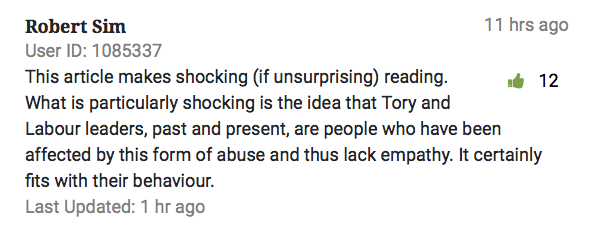
Ok. Let’s hv a THREAD on Baby Laughter…and what it tells you abt baby brains…and about development of the human stress system…and the biology of relationships.
I know ths interaction looks cute & sweet. And it is. And yet, it is *so much more* when you know what to look for.
I know ths interaction looks cute & sweet. And it is. And yet, it is *so much more* when you know what to look for.
https://twitter.com/CBSNews/status/1429835867384918021
2. At .02 we have a baby totally focused on Daddy’s face. And also having a new SENSORY experience - hearing! Big serious eyes. She can maintain her posture. This is a brain, seriously at work integrating stuff! Neurons are firing in the brain big time, building pathways! 

3. By .04, the baby is finding this new hearing thing pleasurable. She’s laughing with the delight. The new SENSORY experience is *comfortable*. Baby Laughter is a massive clue as to what babies’ bodies are experiencing. That’s why researcher @czzpr studies it. 

4. But by .05, it’s all become a tiny bit overwhelming. It’s a bit too exciting Her eyes roll away for a split second, from some of the SENSORY stimulation of Dad’s face. Her stress system can calm down a bit, allowing her to come back for more! 

5. By .08, both Daddy & baby are laughing. They are loving this! Mutual affection & intimacy & delight. The baby’s eyes flash big, allowing light to glint across them. Daddy’s subconscious will note that. The connection helps him fall more deeply in love with her. 

6. By .13, t baby is so excited she’s screeching with delight. That added vocal activity is a lot for a wee body. Its all a bit too much. She loses postural control. She falls back, arms flailing. Daddy’s hands catch her. Her brain gets to learn what TRUST feels like. Lucky baby. 

7. So at .14, Mum gets in on the act. She makes a comment. “OMG, another voice!”, t baby must think! SENSORY experience becomes more complicated! And yet…that young baby can still turn her head, orienting her attentn to the source of that sound. Amazingly complex.Yet, ordinary. 

8. But by .17, all this new exciting SENSORY experience is becoming really overwhelming. The baby needs to self-soothe. She raises her hands to her mouth. Her mouth is open *in advance*. Her stress system is already coordinated. Amazing. Yet ordinary. 

9. By .19, we see t regrettable impact of editing. The film cuts back to cute shared laughter. We don’t see her hands reach her mouth. I reckon the film-editor didn’t know the significance of what they were seeing. (Which is why I craft these threads! Everybody deserves to know.) 

10. By .21, the baby is enthralled once more with Daddy’s voice & smile. Deep intense mutual gaze. The intimacy causes her brain to do the big-eye-flash-glint moment again. When she’s all grown up, it will do that again when she’s flirting romantically. 

11. By .25, we viewers are left in exactly the state the film creators wanted. We are Uplifted. Our own levels of oxytocin have increased, just by watching a Dad & baby giggle together. Social media at its best! Maybe we play it again. More goodness in our own bodies. 

12. But here’s the thing: We watch videos like these and what we usually see is the cuteness, the sweetness, the Ah moments. I hope my threads helps us see that there is SO MUCH MORE going on. I hope this can help parents feel amazed & proud. And early years folk too.
13. I kept putting SENSORY in caps because that’s so so important. We tend to miss that obvious point. A baby’s only way of makng contact with the external world is through her SENSORY SYSTEM. Every single experience for a baby is SENSORY. We need to slow down & let them process.
14. The baby’s sensory system is new, fragile, still developing. So is her stress system. Every single sensory experience she has will leave a trace on how her stress system develops. Daddy’s smile, his hands? They hv a BIOLOGICAL impact on t baby. That is amazing. And ordinary.
15. Of course, if Daddy hadn’t smiled? hadn’t had responsive trustworthy hands?…well…that would be a sensory experience too. And that wd have been built into her stress system instead. Discomfort &comfort. Threat &safety. That’s t two basic categories a stress systm works on.
16. It has taken me an hour to craft ths thread. I do this because this is attachmnt in action. I think *everyone* deserves to know ths stuff. I think all policymakers & practitioners have a *responsibility* to know it. I think we don’t appreciate baby-experiences in our society.
17/end. So let me end with a THANKS to anyone who retweets this thread or who comments on it. Your doing so helps spread t key insight: *Relationships shape us.*
Thank you to @CBSNews for makng my analysis possible. How cd we create more material so folk can see beyond ‘cute’?
Thank you to @CBSNews for makng my analysis possible. How cd we create more material so folk can see beyond ‘cute’?
https://twitter.com/CBSNews/status/1429835867384918021
@KarenAdamMSP @dr_treisman @katesilverton @garywrobinson @john_jonart @RonaMackaySNP @kymscott5 @delafieldbutt @kdenvir @NDNAtalk @lullabynursery @paulinescott222 @NeilMackay @DadsRockOrg @KeeganSmith_Law @lokiscottishrap @AngelaHaggerty @margl43 @gerrydiamond71 @JANEOROURKE
@JuneOSullivan @RuthBoreham @CraigmillarBFB @mannajon @Karafleur @alex_fullerton @parentclubscot @haughey_clare @ElieStreet @braininsights @JKnussen @ScotParents @ParentInfantFdn @drrosieknowles @elaine__d @janeleavey @morsekatie1987 @TheBabyExpert @Bookbug_SBT @BlueRoseCode
@Creative_Voices @childinmind @MoralLandscapes @_LisaCherry @LisaReagan3 @RobinCogan @bvcpantarhei @eperryinsights @Oprah @GiveTimeScot @babyfriendly @BfN_UK @nursery_baird @BertramNG @ArnhallNursery @NurseryWorld @BigNursery @naturehills @LauraHAllain @SollyKathryn @UpstartScot
• • •
Missing some Tweet in this thread? You can try to
force a refresh














